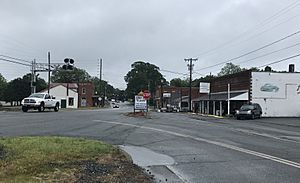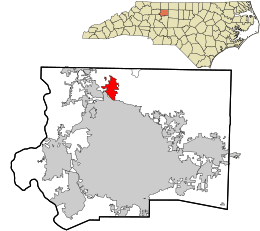Rural Hall, North Carolina facts for kids
Quick facts for kids
Rural Hall, North Carolina
|
|
|---|---|
 |
|
| Motto(s):
"Garden Spot of the World"
|
|

Location in Forsyth County and the state of North Carolina.
|
|
| Country | United States |
| State | North Carolina |
| County | Forsyth |
| Area | |
| • Total | 2.86 sq mi (7.41 km2) |
| • Land | 2.85 sq mi (7.39 km2) |
| • Water | 0.01 sq mi (0.02 km2) |
| Elevation | 965 ft (294 m) |
| Population
(2020)
|
|
| • Total | 3,351 |
| • Density | 1,174.96/sq mi (453.70/km2) |
| Time zone | UTC-5 (Eastern (EST)) |
| • Summer (DST) | UTC-4 (EDT) |
| ZIP codes |
27045
|
| Area code(s) | 336 |
| FIPS code | 37-58360 |
| GNIS feature ID | 2407257 |
Rural Hall is a town in Forsyth County, North Carolina, United States. It is part of the Piedmont Triad, a region in the central part of the state. In 2020, about 3,360 people lived here. The town has a public park called Covington Memorial Park, where you can play and relax.
Contents
Where is Rural Hall Located?
Rural Hall is found in the northern part of Forsyth County. To its south is the larger city of Winston-Salem. The village of Tobaccoville is to the west.
If you want to go to downtown Winston-Salem, it's about 12 miles (19 kilometers) south. You can get there by taking North Carolina Highway 66 and U.S. Route 52.
The town of Rural Hall covers about 2.86 square miles (7.4 square kilometers) of land. Only a tiny part, about 0.01 square miles (0.02 square kilometers), is water.
Who Lives in Rural Hall?
| Historical population | |||
|---|---|---|---|
| Census | Pop. | %± | |
| 1980 | 1,336 | — | |
| 1990 | 1,652 | 23.7% | |
| 2000 | 2,464 | 49.2% | |
| 2010 | 2,937 | 19.2% | |
| 2020 | 3,360 | 14.4% | |
| 2021 (est.) | 3,413 | 16.2% | |
| U.S. Decennial Census | |||
The number of people living in Rural Hall has grown over the years. In 1980, there were 1,336 residents. By 2020, the population had more than doubled to 3,360 people.
Rural Hall's Diverse Community (2020)
In 2020, the town had 3,351 people living in 1,360 households. About 857 of these households were families.
Here's a look at the different groups of people who call Rural Hall home:
- About 60% of the people were White (not Hispanic).
- Around 20% were Black or African American (not Hispanic).
- About 13% of the people were Hispanic or Latino.
- Smaller numbers of people identified as Native American, Asian, Pacific Islander, or from other backgrounds.
A Brief Look at Rural Hall's History
The first known settler in the area was Anthony Bitting. He was born in Pennsylvania and moved to this region in the 1770s. His family, who were German American, still live in the county today. Anthony's grandson, Benjamin Lewis Bitting, built the house that gave Rural Hall its name.
Another early settler was Johann Adam Geiger, also known as Kiger. He gave 102 acres (0.41 square kilometers) of land to the Nazareth Evangelical Lutheran Church. This church still serves the community today.
The town really started to grow after a train station was built in 1887. This station was part of the Cape Fear & Yadkin Valley Railroad.
Today, Rural Hall is an important place for the Yadkin Valley Railroad. Many of their trains can be seen there when they are not working.
The old Rural Hall Depot is a very important building. It was added to the National Register of Historic Places in 1983. This means it's a special place that helps tell the story of the town.
See also
 In Spanish: Rural Hall para niños
In Spanish: Rural Hall para niños

